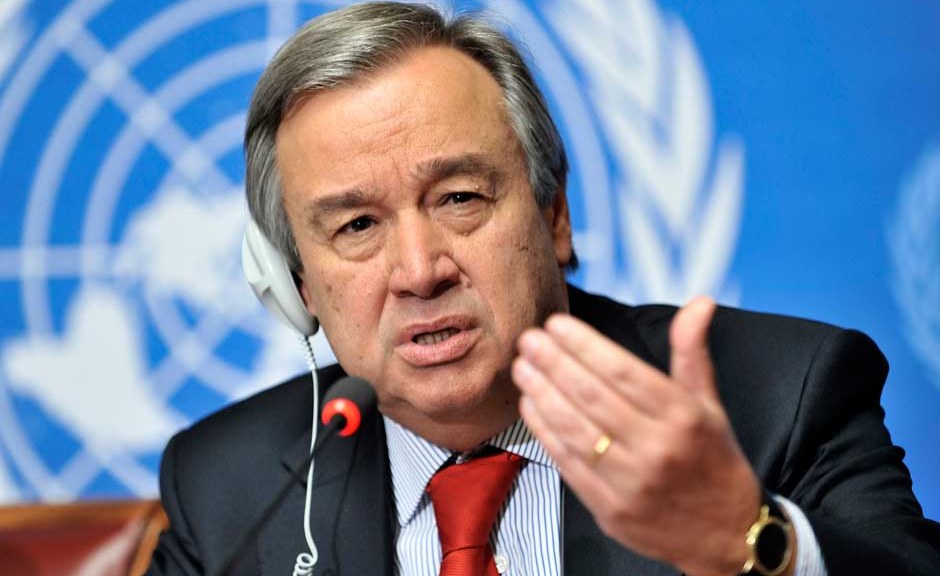New York — U.N. Secretary-General Antonio Guterres told an international conference on food security Friday that the world is facing the “real risk” of multiple famines this year and that 2023 could be even worse.
“The war in Ukraine has compounded problems that have been brewing for years: climate disruption; the COVID-19 pandemic; the deeply unequal recovery,” Guterres said by video message to the Uniting for Global Food Security ministerial conference in Berlin.
He said rising fuel and fertilizer prices are dramatically affecting the world’s farmers.
“All harvests will be hit, including rice and corn – affecting billions of people across Asia, Africa and the Americas,” Guterres said. “This year’s food access issues could become next year’s global food shortage.”
He warned that no country would be immune to the social and economic fallout.
Russia’s February 24 invasion of Ukraine has led to availability and supply chain disruptions. The United Nations says more than 36 countries get half or more of their grain supply from the Black Sea region.
In addition to destroying and stealing some Ukrainian grain, Russia’s military has blockaded the country’s key southern port of Odesa, preventing more than 20 million tons of Ukrainian grain from being exported. The Kremlin has also held back some of its own grain and fertilizer production from global markets, claiming Western sanctions are obstructing their export.
“Nothing – nothing — is preventing food and fertilizer from leaving Russia,” U.S. Secretary of State Antony Blinken said of the sanctions. “And only one country is blocking food and fertilizer from leaving Ukraine and that is Russia.”
Japan’s foreign minister noted that Russia’s own statistics show its wheat exports had doubled this May over last year.
“Despite this, Russia is spreading disinformation to the contrary,” Yoshimasa Hayashi said.
Ending the blockade
Guterres has been conducting intense, private diplomacy with Russia and Ukraine, as well as Turkey, which could soon host grain talks between the warring parties, and key actors the United States and European Union. His goal is a package deal that would let Ukraine export its grain, not only by land but also through the Black Sea, and would bring Russian food and fertilizer to world markets.
Getting the port of Odesa open and safely functioning again is a top priority.
“We have got to get the port of Odesa open right now,” World Food Program chief David Beasley told the conference. “Failure to do so is a declaration of war on global food security — it is that simple.”
The grain in the silos must be exported before it begins to rot. It also needs to be moved to make way for the next grain harvest that will begin in September.
In the meantime, neighbor Romania has been stepping up to help Kyiv get its grain out.
“We are receiving Ukrainian grain by road, rail, sea and the Danube River,” Romanian Foreign Minister Bogdan Aurescu told the meeting. “Since the start of the invasion, the Romanian Black Sea port of Constanta, which is the largest port on the Black Sea, has become the main gateway for Ukrainian grain shipments to the outside world.”
He said Romania is working to make Constanta a European food hub and increase its processing capacity. In 2021, he said more than 25 million tons of grain were exported through Constanta.
The African continent has been badly hit by the impacts of the grain and fertilizer shortages, as many of those nations receive large quantities of these imports from the Black Sea region.
“My country, the Democratic Republic of Congo, it had to lift value added tax on basic foods, had to subsidize products such as fuel, in order to avoid uprisings as a consequence of the general price increases,” said Minister of Planning Christian Mwando Nsimba Kabulo. “Of course, this has enormous consequences for the national budget of my country, and it makes the efforts for greater resilience more difficult.”
“There is a straight line between the actions in the war in Ukraine and the suffering we see in the [global] South,” U.N. humanitarian chief Martin Griffiths said.
Action and announcements of assistance for the most vulnerable nations are expected in the coming days, as members of the world’s largest economies meet in Germany for the G-7 summit.
Source link

